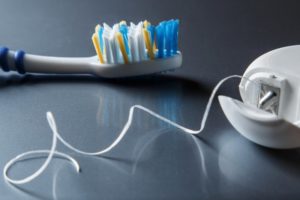Should You Floss Before or After Brushing Your Teeth?
March 11, 2020
 According to dental experts, brushing your teeth only removes about 60% of the harmful plaque and bacteria from your mouth. The other 40% have accumulated in small spaces that your toothbrush bristles can’t reach, like between your teeth and just under your gumline. Dental floss can easily clean out these areas, but should you floss your teeth before or after you brush them? Your dentist near Michigan City explains why when you floss matters and how you can make the most out of your dental routine.
According to dental experts, brushing your teeth only removes about 60% of the harmful plaque and bacteria from your mouth. The other 40% have accumulated in small spaces that your toothbrush bristles can’t reach, like between your teeth and just under your gumline. Dental floss can easily clean out these areas, but should you floss your teeth before or after you brush them? Your dentist near Michigan City explains why when you floss matters and how you can make the most out of your dental routine.
Brushing, Flossing, and Fluoride
First, let’s look at how fluoride works. Fluoride is a common mineral that’s used in many dental products like toothpaste and mouthwash. When it’s introduced into your mouth, it is absorbed by the enamel of your teeth. Your enamel is already the hardest substance in your body, but when it combines with fluoride it becomes even stronger. This new material protects your teeth from chipping and cracking and helps it resist decay.
Brushing and flossing are both important tools for spreading fluoride onto your teeth as well as removing plaque and bacteria. While your toothbrush does an excellent job of cleaning the visible surfaces of your teeth, only dental floss can reach between them. However, studies are beginning to indicate that practicing one before the other influences how well your teeth are coated in this important mineral.
Should You Brush or Floss First?
Some people believe that flossing after brushing your teeth helps to work the fluoride into those small, hard to clean places. However, recent research from the American Academy of Periodontology revealed that participants who flossed before brushing had less plaque in their mouth and retained more fluoride than those who flossed after brushing. They believe that removing debris from between your teeth beforehand allows the fluoride to seep into the newly cleaned enamel. Additionally, flossing afterwards may scrape off the fluoride applied by a toothbrush.
The Best Time to Floss
Currently, there is a growing body of evidence that suggests flossing your teeth before brushing them is the more effective option. However, the most important part of your brushing and flossing routine is that you’re practicing it regularly. Routinely clearing away plaque and fortifying your teeth with fluoride drastically reduces your chances of tooth decay, gum disease, and other serious oral health conditions. Be sure to floss at least once a day and brush your teeth for two minutes twice a day to keep your smile happy and healthy!
About the Author
At Edgewood Dental in Michigan City, IN we firmly believe the motto “an ounce of prevention is worth a pound of cure.” That’s why we encourage all our patients to come in for their dental checkups every six months. Dr. Valerie Haughtington and Dr. Vidas Noreika are committed to keeping your oral health at its best by spotting and stopping little issues before they become problems. Since great oral hygiene starts at home, they’d also be more than happy to go over how you can get the most out of your personal dental routine. If you have more questions about brushing or flossing, feel free to contact them via their website or at (219) 898-4545.
No Comments
No comments yet.
RSS feed for comments on this post.
Sorry, the comment form is closed at this time.
